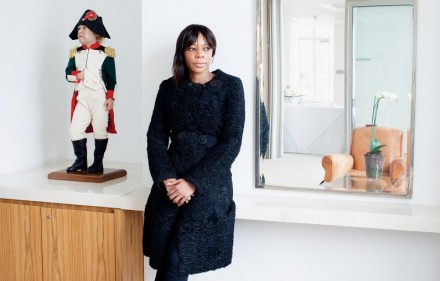

From: Berhane Habtemariam (Berhane.Habtemariam@gmx.de)
Date: Fri Mar 19 2010 - 09:05:54 EST
The NS Interview: Dambisa Moyo, economist
<http://www.newstatesman.com/writers/sophie_elmhirst> Sophie Elmhirst
Published 19 March 2010
"People need jobs and investment. There is no magic trick"
http://images.newstatesman.com/articles/2010/20100303_2010+10moyo_w.jpg
Q: Your vision for Africa's future is a controversial one. Do you really
believe that aid is dead?
If aid were a private-sector business or a political system, it would
definitely have gone by now. But here we have a system that has been going
on and on and not delivering.
Q: So what's your solution?
There is no evidence anywhere on earth that aid has delivered long-term
growth. The countries that have moved hundreds and millions of people out of
poverty in our lifetime - China, India, South Africa, Botswana - have not
relied on aid to the extent that some African countries do. Can we have a
discussion about that?
Q: How do you answer those who say aid is essential to development?
Behind closed doors, pretty much every international aid minister says that
there is a fundamental problem with the system. Many African leaders are on
record saying that it doesn't work, including Paul Kagame [of Rwanda] and
Raila Odinga [of Kenya].
Q: What about in a case like Haiti?
People need jobs. There is no magic trick. You need investment and job
creation. Haiti can't come out of this disaster dependent on aid - it's not
viable.
Q: What do you think of Barack Obama's attitude to the developing world?
It is too early to tell. But, as Africans, we can't continue to depend on
the US. When America has double-digit unemployment, the government's
priority is to provide for its people.
Q: Don't developing countries need the help of rich ones to mitigate the
effects of climate change?
The people at the forefront of this agenda are not going to be the aid
agencies. In the past, the big development issues were led by western
governments and the emerging markets were silent. But now, we've got a
situation where they are taking much more of a lead.
Q: Do you aim to influence African policy?
No. Most of what needs to be done in Africa should be spearheaded by African
leaders. The fundamental problem is that the aid industry has become so
pervasive that governments abdicate their responsibilities.
Q: Would you ever get involved in politics?
I'm not a politician - it's not my cup of tea. I wouldn't be surprised if I
ended up in finance again. Perhaps in developing markets.
Q: Is there a plan?
No plan whatsoever. Life expectancy in Zambia is 39, so I am just happy to
be here.
Q: Has the financial crisis exposed the western economic system as
unworkable?
Quite the contrary. Unfettered capitalism does not work, but over the past
300 years capitalism has created jobs and reduced poverty. To turn around
and say that it is defunct is really a stretch. The banks didn't do anything
illegal. It's completely simplistic to say that they are bad.
Q: As an ex-banker, can you sympathise with the public fury over bank
bonuses?
I don't think it's misplaced. If you are a taxpayer, you should be outraged.
But it requires a more nuanced discussion.
Q: You're now writing a book on "how the west was lost". Can you give us a
preview?
Standard models of economic development have three ingredients: capital,
labour and technology. I'm looking at how government policies on these have
yielded bad outcomes.
Q: What's your vision of the future?
By 2027, China will be the biggest country in the world. This year is the
first year that Europe's population will decline. Our populations are
changing. If you want to keep in the game, you have to do something
transformational.
Q: Do you want to go back to Zambia?
Absolutely. My family is there. Educated Africans won't stay if they are not
getting paid what they think they are worth. But we have seen it in Ghana
and Uganda - when things get more transparent, droves of people go home.
Q: Do you vote?
You would be hard-pressed to find an African-born woman who doesn't.
Q: Is there anything you regret?
I don't think so. I am fortunate: my parents told me the world was my
oyster, when they could have said I wouldn't make it for a lot of reasons -
rural, girl, small African country. So, no regrets.
Q: Do some Africans lack that self-belief?
Many Africans succumb to the idea that they can't do things because of what
society says. Images of Africa are negative - war, corruption, poverty. We
need to be proud of our culture.
Q: Are we all doomed?
Not at all. I am an eternal optimist. Look at me: I'm from the bowels of
Africa, from a country without a coastline. I couldn't even have swum here.
It would be impossible for me to think that we are doomed. I'm here, aren't
I?
Defining Moments
1969 Born in Lusaka, Zambia. Moves to the US as a child, but returns for
high school
1991-93 Back in the US, takes MBA, MPA at American University (DC) and
Harvard
1993-95 Works at World Bank. Moves to the UK for a PhD in economics at
Oxford
2001 Joins Goldman Sachs as a research economist and strategist
2009 Penguin publishes her first book - Dead Aid: Why Aid Is Not Working and
How There Is a Better Way for Africa

----[This List to be used for Eritrea Related News Only]----
